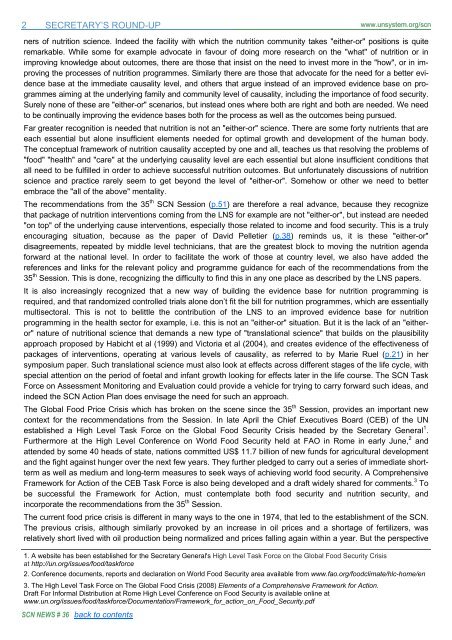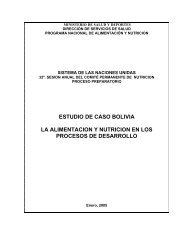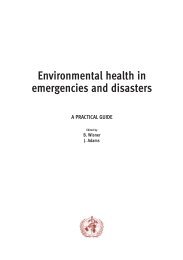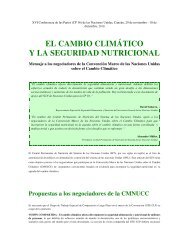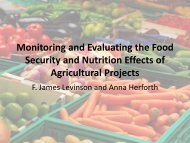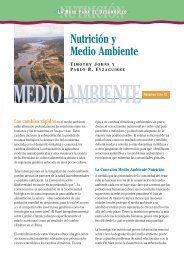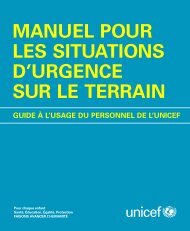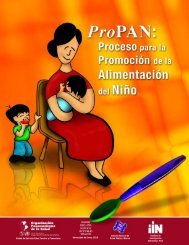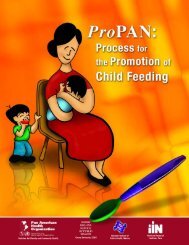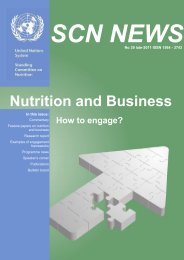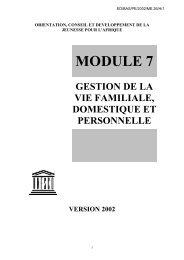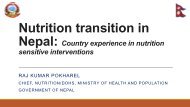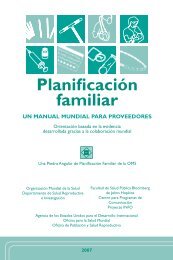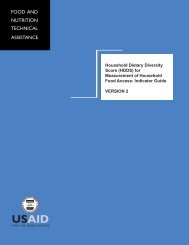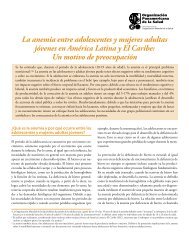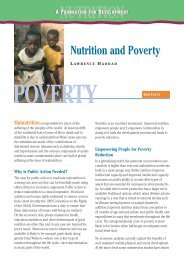SCN News No 36 - UNSCN
SCN News No 36 - UNSCN
SCN News No 36 - UNSCN
You also want an ePaper? Increase the reach of your titles
YUMPU automatically turns print PDFs into web optimized ePapers that Google loves.
2<br />
SECRETARY’S ROUND-UP<br />
www.unsystem.org/scn<br />
ners of nutrition science. Indeed the facility with which the nutrition community takes "either-or" positions is quite<br />
remarkable. While some for example advocate in favour of doing more research on the "what" of nutrition or in<br />
improving knowledge about outcomes, there are those that insist on the need to invest more in the "how", or in improving<br />
the processes of nutrition programmes. Similarly there are those that advocate for the need for a better evidence<br />
base at the immediate causality level, and others that argue instead of an improved evidence base on programmes<br />
aiming at the underlying family and community level of causality, including the importance of food security.<br />
Surely none of these are "either-or" scenarios, but instead ones where both are right and both are needed. We need<br />
to be continually improving the evidence bases both for the process as well as the outcomes being pursued.<br />
Far greater recognition is needed that nutrition is not an "either-or" science. There are some forty nutrients that are<br />
each essential but alone insufficient elements needed for optimal growth and development of the human body.<br />
The conceptual framework of nutrition causality accepted by one and all, teaches us that resolving the problems of<br />
"food" "health" and "care" at the underlying causality level are each essential but alone insufficient conditions that<br />
all need to be fulfilled in order to achieve successful nutrition outcomes. But unfortunately discussions of nutrition<br />
science and practice rarely seem to get beyond the level of "either-or". Somehow or other we need to better<br />
embrace the "all of the above" mentality.<br />
The recommendations from the 35 th <strong>SCN</strong> Session (p.51) are therefore a real advance, because they recognize<br />
that package of nutrition interventions coming from the LNS for example are not "either-or", but instead are needed<br />
"on top" of the underlying cause interventions, especially those related to income and food security. This is a truly<br />
encouraging situation, because as the paper of David Pelletier (p.38) reminds us, it is these "either-or"<br />
disagreements, repeated by middle level technicians, that are the greatest block to moving the nutrition agenda<br />
forward at the national level. In order to facilitate the work of those at country level, we also have added the<br />
references and links for the relevant policy and programme guidance for each of the recommendations from the<br />
35 th Session. This is done, recognizing the difficulty to find this in any one place as described by the LNS papers.<br />
It is also increasingly recognized that a new way of building the evidence base for nutrition programming is<br />
required, and that randomized controlled trials alone don’t fit the bill for nutrition programmes, which are essentially<br />
multisectoral. This is not to belittle the contribution of the LNS to an improved evidence base for nutrition<br />
programming in the health sector for example, i.e. this is not an "either-or" situation. But it is the lack of an "eitheror"<br />
nature of nutritional science that demands a new type of "translational science" that builds on the plausibility<br />
approach proposed by Habicht et al (1999) and Victoria et al (2004), and creates evidence of the effectiveness of<br />
packages of interventions, operating at various levels of causality, as referred to by Marie Ruel (p.21) in her<br />
symposium paper. Such translational science must also look at effects across different stages of the life cycle, with<br />
special attention on the period of foetal and infant growth looking for effects later in the life course. The <strong>SCN</strong> Task<br />
Force on Assessment Monitoring and Evaluation could provide a vehicle for trying to carry forward such ideas, and<br />
indeed the <strong>SCN</strong> Action Plan does envisage the need for such an approach.<br />
The Global Food Price Crisis which has broken on the scene since the 35 th Session, provides an important new<br />
context for the recommendations from the Session. In late April the Chief Executives Board (CEB) of the UN<br />
established a High Level Task Force on the Global Food Security Crisis headed by the Secretary General 1 .<br />
Furthermore at the High Level Conference on World Food Security held at FAO in Rome in early June, 2 and<br />
attended by some 40 heads of state, nations committed US$ 11.7 billion of new funds for agricultural development<br />
and the fight against hunger over the next few years. They further pledged to carry out a series of immediate shortterm<br />
as well as medium and long-term measures to seek ways of achieving world food security. A Comprehensive<br />
Framework for Action of the CEB Task Force is also being developed and a draft widely shared for comments. 3 To<br />
be successful the Framework for Action, must contemplate both food security and nutrition security, and<br />
incorporate the recommendations from the 35 th Session.<br />
The current food price crisis is different in many ways to the one in 1974, that led to the establishment of the <strong>SCN</strong>.<br />
The previous crisis, although similarly provoked by an increase in oil prices and a shortage of fertilizers, was<br />
relatively short lived with oil production being normalized and prices falling again within a year. But the perspective<br />
1. A website has been established for the Secretary General's High Level Task Force on the Global Food Security Crisis<br />
at http://un.org/issues/food/taskforce<br />
2. Conference documents, reports and declaration on World Food Security area available from www.fao.org/foodclimate/hlc-home/en<br />
3. The High Level Task Force on The Global Food Crisis (2008) Elements of a Comprehensive Framework for Action.<br />
Draft For Informal Distribution at Rome High Level Conference on Food Security is available online at<br />
www.un.org/issues/food/taskforce/Documentation/Framework_for_action_on_Food_Security.pdf<br />
<strong>SCN</strong> NEWS # <strong>36</strong> back to contents


